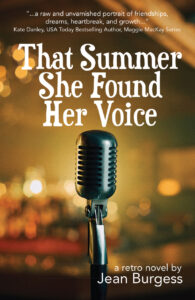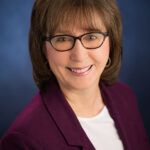Author Jean Burgess is chatting with me today about her new women’s fiction, That Summer She Found Her Voice: A Retro Novel.

Bio:
Jean Burgess, Ph.D. is a writer, playwright, editor, and former theatre educator. Her nonfiction, Collaborative Stage Directing: A Guide to Creating and Managing a Positive Theatre Environment, was published by Routledge/Taylor & Francis in 2019. Her debut fiction, That Summer She Found Her Voice: A Retro Novel, is scheduled for released April 2024 by Apprentice House Press. Jean is a member of The Authors’ Guild, Eastern Shore Writers’ Association, and Maryland Writers’ Association, where she serves as facilitator for the Carroll County Teen Writing Club. She holds an MA in Theatre from Northwestern University and a Ph.D. in Educational Theatre from NYU.
Welcome, Jean. Please tell us about your current release.
That Summer She Found Her Voice: A Retro Novel is set in 1978 with locales in Maryland’s Eastern Shore, Baltimore’s Little Italy, and cities across the US. Against a backdrop of 1970s music, this is the story of 23-year-old Margie Stevens as she pulls herself out of a spiraling, heartbreak-induced depression and begins a journey of discovery.
Clarifying her own views on emerging feminism, social injustice, and personal spirituality – all while touring across the country as a singer in King Vido’s Swing Band, Margie encounters sexist and moral challenges that cause her to question her future path.
Like many of us, Margie struggles to find her authentic voice and learn to speak up for herself.
What inspired you to write this book?
I come from a professional theatre background and, in fact, did perform as a singer/dancer on a short tour with a Big Band in the 1970s. However, this book is a fictionalize story, loosely based on that experience. The characters are drawn from a conglomerate of the many theatre folk I’ve met in my 35+ performing – the directors, musicians, actors, costumers, etc.
Excerpt from That Summer She Found Her Voice: A Retro Novel:
(Here’s an excerpt written about a situation that really happened to me when I was on the road)
To top the evening off in even more bizarre fashion, about halfway through the first set, I noticed a note passing through the sax section, from Bernard to Ricky to Connie, who of course read it. I paid little attention, thinking King had some important message for her, until she handed it to me. It read:
Margie: Sing harmony on the next song
Panic set in. Harmony? What’s the next song? I whispered to Connie asking if she knew, but she only shrugged. She wanted me to fail. Yikes. I’m going to fail. I began to hyperventilate and felt a panic attack coming on. My heart pounded out of my chest, my throat tightened, and I began to sweat. Breathe, Margie. Slow, deep breaths. You got this. In and slowly out. Again. In and slowly out. Somehow I calmed myself, regaining control.
The band finished “Chattanooga Choo Choo” and Connie moved to the microphone. I followed her, glancing back at Chaz, who mouthed “Blue Moon.” My mind raced through the lyrics of “Blue Moon.” Crap! I only know the words to the first verse, and not the chorus of “Blue Moon.” The band finished the intro and plowed ahead into the first verse. Too late now, gotta wing it!
What exciting project are you working on next?
I’m excited to report that I’m writing a sequel to That Summer She Found Her Voice, a What-Happens-To-Margie-Next! It is set in New York City from 1981-1983. Right now, I’m immersed in the fun research stage – pulling photos of The Big Apple during the 80s time period, getting the clothing right, listening to punk music on YouTube, pouring over New York Times archives to weave pertinent news items into my plot outline.

When did you first consider yourself a writer?
Very late in life. I really didn’t have much confidence in my writing until I wrote my dissertation (published in 2002). Writing that 300+ document gave me the confidence and realization that I am a disciplined writer who communicates logically. In 2017 I began writing a nonfiction, Collaborative Stage Directing, and secured a publisher, Routledge/Taylor & Francis. When it was published in 2019, I finally felt that I could call myself a writer.
Do you write full-time? If so, what’s your workday like? If not, what do you do other than write and how do you find time to write?
Yes and no. I am blessed that I retired in 2020 (Covid’s isolation had a bit to do with that decision.) And I immediately began writing full-time, which resulted in That Summer She Found Her Voice. However, now that my debut fiction will be released April 2024, I find that I am spending more hours per day on marketing/publicity responsibilities than writing. It’s a blessing and a curse that I am learning how to navigate!
Finding time to write has been very challenging at the moment. My new plan is to designate one day a week strictly for writing. This has worked better for me than trying to carve out a few hours daily for writing and a few hours for marketing tasks. I learned that I don’t do well drastically shifting gears.
What would you say is your interesting writing quirk?
I’m a visual learner and need visual stimulus. I write in my office (sorry I don’t have a more quirky or exotic answer here). However, when I’m working on a project, my office is crowded with bulletin boards filled with worldbuilding images: clothing, makeup and accessories, maps, photos of places, etc. I rely on these visuals throughout my writing process.
As a child, what did you want to be when you grew up?
An actress. No doubt.
Anything additional you want to share with the readers?
Nothing thrills me more than to share information (in this case about 1970s themes) and to start conversations. In fact, That Summer She Found Her Voice includes a “Topics for Discussion” in the back pages – perfect for Book Clubs!
